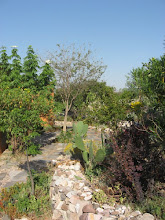Being Green in the 21st Century is not easy. It's not that developing a green lifestyle is particularly difficult. How-to's, organizations, websites, government agencies, clubs, schools, individuals are all in place to help someone develop their own Green viewpoint. Companies have developed products, from solar panels to electronic composting toilets to electric cars to new age "cosmic" life enhancements. Service companies can come to your home and set up systems and maintain your Green home and deliver the latest in Organic produce and home care products.
Where being Green isn't easy is when you decide to maintain that lifestyle for a lifetime. When you decide that it's really up to you to do your part and pay attention to the process and the outcome. Then, a Green lifestyle gets a bit more difficult. You can be a Green consumer and still not understand the link of your actions to the welfare of the inhabitants of the Earth.
Green means making the choices that will least effect the planet. Processed foods, even in health food stores, even "produced and [especially] packaged in the US," may have traveled the globe to get to the shelf. For example, I was talking to someone who produced a tofu-"meat" product. This, for vegetarian, holiday consumption. It turns out that he made the product in vats in the US, shipped it to Taiwan, where it was pressed into molds and packed in containers; then it was shipped back to the US for labeling and marketing. In the name of health, this product's carbon footprint was huge.
Organic chips and crackers, and cereals and ready-made consumables can be delicious, but almost all of them [locally produced and locally marketed can be the exceptions, here] are made in some central plant and shipped throughout the nation. The alternative?? Make them yourself. Recipes abound for crackers, cereal, dinners, lunches, breakfasts. If you think you don't have the time for this, or some of this, maybe you need to pay attention to your use of time itself. Being Green means taking care of the planet, starting with yourself.
And being Green means paying attention to the the income and outflow of utilities, water and sewage, electricity; packaged products in and where the packaging goes (i.e., is it recycled or put in the trash---which is the larger outflow of the two?). And kitchen "waste." Is it being composted or thrown away or sent down the drain? And green "waste." Is it staying on your property to be composted, or is sent to the green recycling, or is it "trash?"
Being Green is not difficult because there are resources, being Green is difficult because you have to tap into your inner resources. And keep tapping into them. And keep paying attention. And keep on doing it for your life time. But it's worth it.
Subscribe to:
Post Comments (Atom)

No comments:
Post a Comment